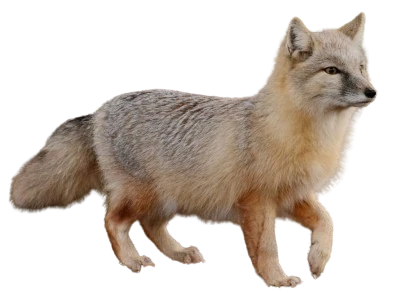Corsac Fox: A Stealthy Hunter of the Steppes
The Corsac Fox (Vulpes corsac) is an elegant and discreet canid inhabiting the vast steppes of Central Asia. Adapted to arid conditions, it is known for its agility and ability to survive in harsh environments.
Physical Description of the Dog
The Corsac Fox is medium-sized, measuring approximately 50 to 60 cm in length, with a bushy tail reaching 20 to 35 cm. It typically weighs between 2 and 4 kg. Its coat, ranging from pale gray to sandy brown, provides excellent camouflage in the steppes. It has relatively short ears and expressive eyes adapted for nocturnal vision.
Classification
The Corsac Fox (Vulpes corsac) belongs to the Canidae family, alongside foxes, wolves, and domestic dogs.
- Kingdom: Animalia (Animals)
- Phylum: Chordata (Chordates)
- Class: Mammalia (Mammals)
- Order: Carnivora (Carnivores)
- Family: Canidae (Canids)
- Genus: Vulpes
- Species: Vulpes corsac
Habitat
The Corsac Fox primarily inhabits the steppes, grasslands, and semi-deserts of Central Asia, from Mongolia to Kazakhstan. It prefers open habitats with sparse vegetation, avoiding forests and dense mountainous areas. It occupies abandoned burrows or digs its own to shelter from predators and extreme temperatures.
Behavior and Social Life
Mainly nocturnal, the Corsac Fox is a solitary hunter but can form small family groups during winter. It communicates with various vocalizations and uses its urine to mark its territory. Although non-territorial in summer, it becomes more defensive in winter when food resources are scarce.
Diet
The Corsac Fox's diet is varied and opportunistic. It feeds on rodents, small birds, insects, and occasionally fruits. It can also survive without drinking water, obtaining necessary moisture from its prey.
Conservation
Classified as "Least Concern" by the IUCN, the Corsac Fox faces threats such as hunting, habitat loss due to overgrazing, and human development. Raising awareness of its ecological role and sustainably managing steppes are crucial to its survival.
Closest Genetic Cousins
The Corsac Fox belongs to the genus Vulpes, which also includes the Red Fox (Vulpes vulpes), the Fennec Fox (Vulpes zerda), and the Tibetan Fox (Vulpes ferrilata). These species share common characteristics, such as their small size and adaptation to various environments.
-
The Red Fox is one of the most widespread and adaptable fox species. It is present on several continents, including Europe, Asia, and North America. The Red Fox is known for its characteristic reddish fur and its ability to adapt to a wide variety of habitats, from forests to urban areas.
-
The Fennec Fox is the smallest of the foxes and is adapted to desert environments. It is primarily found in the Sahara and other arid regions of North Africa. The Fennec Fox is recognizable by its large ears, which help it dissipate heat and detect prey beneath the sand.
-
The Tibetan Fox is endemic to the high plateaus of Tibet. It is adapted to the extreme conditions of high altitude and cold. The Tibetan Fox has a dense coat and a thick tail to protect it from freezing temperatures. This species is threatened by habitat loss and hunting.
Tips for Observers
Observing the Corsac Fox in its natural habitat can be a rewarding experience. Here are some tips to enjoy it while respecting this discreet animal:
- Choose the right time: Corsac foxes are mainly active at dusk and dawn. These moments offer the best chances for observation.
- Use appropriate equipment: Bring binoculars or a camera with a telephoto lens to observe from a distance without disturbing the animal.
- Stay quiet: Avoid sudden noises that might scare the fox. Be patient and discreet.
- Respect the environment: Leave no waste and do not disturb burrows, even if they appear abandoned.
- Hire a local guide: An experienced guide can help you locate areas where foxes are frequently spotted.
- Protect yourself: Bring water, wear appropriate clothing for the climate, and prepare for variable temperatures in the steppes.
By following these recommendations, you can observe the Corsac Fox respectfully while preserving its habitat.
The Corsac Fox, discreet and resilient, embodies the adaptability of species living in extreme environments. Preserving its natural habitats is crucial to maintaining the ecological balance of the steppes.
Wild Dog Breeds
© 2023 touslestoutous.com − All doggies. All rights reserved.
"The data available on this site may be used provided that the source is duly acknowledged."
